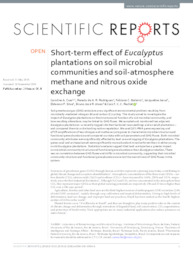Short-term effect of Eucalyptus plantations on soil microbial communities and soil-atmosphere methane and nitrous oxide exchange.
Short-term effect of Eucalyptus plantations on soil microbial communities and soil-atmosphere methane and nitrous oxide exchange.
Author(s): CUER, C. A.; RODRIGUES, R. de A. R.; BALIEIRO, F. de C.; JESUS, J.; SILVA, E. P.; ALVES, B. J. R.; RACHID, C. T. C. C.
Summary: Soil greenhouse gas (GHG) emissions are a significant environmental problem resulting from microbially-mediated nitrogen (N) and carbon (C) cycling. This study aimed to investigate the impact of Eucalyptus plantations on the structure and function of a soil microbial community, and how resulting alterations may be linked to GHG fluxes. We sampled and monitored two adjacent Eucalyptus plantations - a recently logged site that harbored new seedlings and an adult plantation - and compared them to a site hosting native vegetation. We used 16S rRNA gene sequencing and qPCR amplifications of key nitrogen and methane cycle genes to characterize microbial structure and functional gene abundance and compared our data with soil parameters and GHG fluxes. Both microbial community attributes were significantly affected by land use and logging of Eucalyptus plantations. The genes nosZ and archaeal amoA were significantly more abundant in native forest than in either young or old Eucalyptus plantations. Statistical analyses suggest that land use type has a greater impact on microbial community structure and functional gene abundance than Eucalyptus rotation. There was no correlation between GHG fluxes and shifts in microbial community, suggesting that microbial community structure and functional gene abundance are not the main drivers of GHG fluxes in this system.
Publication year: 2018
Types of publication: Journal article
Unit: Embrapa Soils
Observation
Some of Embrapa's publications are published as ePub files. To read them, use or download one of the following free software options to your computer or mobile device. Android: Google Play Books; IOS: iBooks; Windows and Linux: Calibre.
Access other publications
Access the Agricultural Research Database (BDPA) to consult Embrapa's full library collection and records.
Visit Embrapa Bookstore to purchase books and other publications sold by Embrapa.

